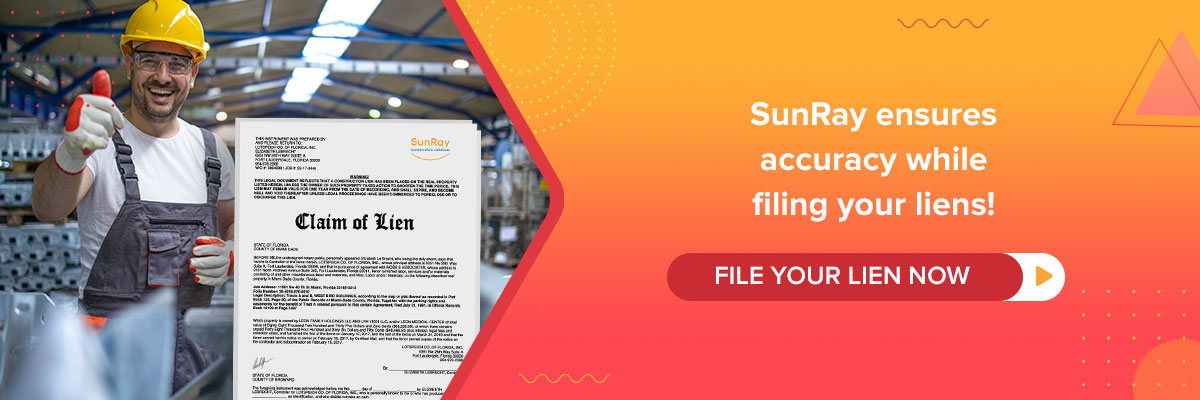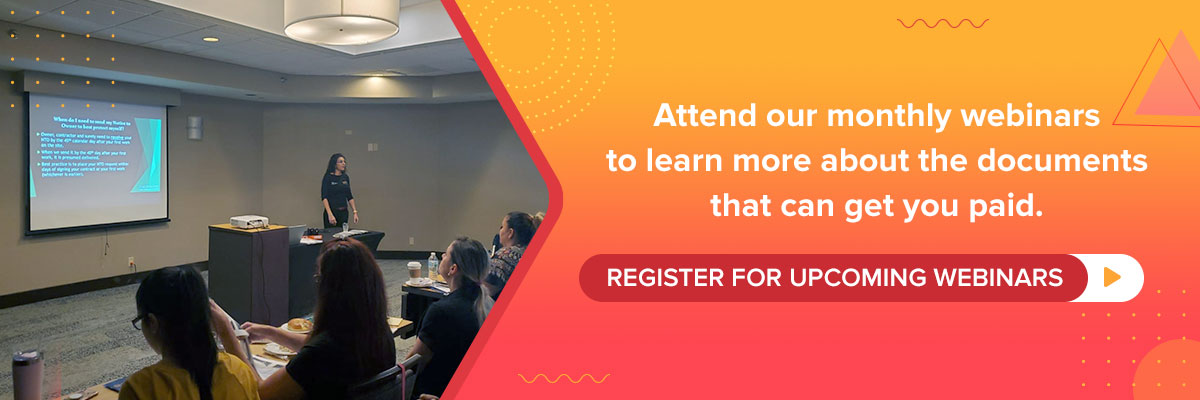What Happens After I Record My Lien? How Do I Get Paid? - Florida - Webinar
Learn about a claim of lien, what a surety bond is, and when you should hire a construction lawyer or construction attorney to get paid.
Last updated:
Jul
11
,
2025
Published:
Jul 02, 2021
11 Mins
Read
A construction lien is a very important document. Learn what it is and how it works, what happens after you record a lien, how you can get paid, when to hire a construction lawyer or construction attorney, what it means if your lien is bonded off, what happens if you receive a Notice of Contest of Lien, what happens if your lien is bonded off, how the other party will use a surety bond, when to file a lawsuit after filing a Claim of Lien, and what happens if you receive a 20-Day Summons.
This blog is from a webinar that was presented by SunRay Construction Solutions and Alex Barthet. Alex is a board-certified construction lawyer serving clients in Florida.
What Is a Lien and How Does it Work?
Now we will discuss what a lien is and how it works.
What is a lien?
A lien is an encumbrance on real property, meaning that it prevents people from selling and refinancing the property because you have made a claim to some interest in it. It is a cloud on the title of the property just like a mortgage.

a. It is a technical default under most mortgages
If a lien does exist on a property, that typically is what is called a ‘technical default’ under most mortgages. Sometimes if you inform the mortgage company that you have recorded a lien on the property, that can sometimes spur an owner to pay.
b. May be a default under a prime construction contract
Because they may get a letter from their mortgage company saying there is a lien on the property and that you need to take care of it because that constitutes a default on the mortgage. It does not always work, but on residential mortgages, it may have an effect.
The other thing that a lien does, depending on where you are in the chain of contracts, that lien is going to prevent the owner from paying the prime contractor. So your construction lien is like a wrench thrown into the gears of the payment process between an owner and a contractor. That by itself may get you paid.
c. Can prevent the lender, owner, or contractor from funding
If there is a lender involved in the construction project, lenders do not want to fund month to month on a project if there are any liens on the project. There are some ways to get around it but generally speaking, lenders are not going to want to continue to fund a construction loan.
What Happens After I Record My Lien?
The short answer is: nothing by itself. So far, we have discussed some of the pressure that the lien creates, but aside from that, nothing happens on its own. If you record a lien with SunRay for example, we will prepare and record the lien electronically for you.

It just sits there then. Nothing happens. The court does not automatically kick into gear to get you paid. So generally speaking, unless the lien bothers someone enough to pay you, it just sits there.
How Do I Get Paid?
So now the question is: if nothing happens by itself, how do I get paid?
a. A lien only starts the process
Well, you have to understand that the lien is not the beginning of the process. It is actually the Notice to Owner. We have done many other webinars in the past, and they are on our website as well as our YouTube channel. We will do more in the year about Notices to Owner and the importance of those documents.
b. It is up to you to enforce your lien rights
Now, once you send the notice and you record your construction lien because you have not been paid, that really is what kicks off this whole process. So, it is up to you to enforce your legal rights through an action known as a foreclosure.

This effectively tells the court with court papers (and means you have to hire a construction lawyer), that you are claiming an interest in this piece of property, and you would like the court to sell the property such that any equity that exists on the property be given to you and anyone else who may have an interest in the property.
This takes it from the owner, sells it to a third party, and then pays the people that are owed money. That is what the foreclosure process is.
c. It is similar to any other court action in cost and time
This process is similar to any other court process as far as time and money. If you wanted a rough estimate, a fully contested foreclosure could take eight to 18 months, and it could cost tens of thousands of dollars in legal fees before you get to the end. Most every case settles, it usually does not take that long, and it usually does not cost tens of thousands of dollars because the lien and foreclosure process is intended to bring some pressure to bear on the parties that owe you the money, to force them to pay you.
So many times, we see that the lien by itself gets you paid. If that does not get you paid, then within several months after filing the lawsuit, you can usually get paid unless it is tremendously complicated. There are lots of issue like delays and claims of defective work. But those issues aside, the pressure of the lawsuit usually gets you paid.
d. Unless shortened, you have one year from the recording date to file suit to foreclose
Unless the time is shortened, you have one year from the recording date of the construction lien to file your lawsuit to foreclose on your lien. That is the outside deadline, and we do not recommend taking that long. But if you want to wait until the absolute last minute unless it is shortened, you typically have one year to file that lawsuit.
Now this is something very important to know: you do not re-record the lien at the expiration of the year. If you do not file a lawsuit within the one year to foreclose on your lien, your lien is gone forever, and it will not come back. You cannot re-record the lien. So, you have to make a decision before that time if you are going to go through the process of the foreclosure to keep that lien alive on the property.

e. Practice the 60/60 rule
One of the other things we recommend is what we call the 60/60 rule of collections. The last date of work is when the time is measured for you to record your lien, you have up to 90 calendar days, counting all weekdays, weekends, and legal holidays in between, to record your lien.
i. No later than 60 days from last work, record the lien
We would say that no later than about Day 60, after your last work, that is when you should start the process to record your lien. Do not wait until the 85th day or the 70th day. Some people will take action a day before the lien is due to be recorded and that is a challenge to get it recorded in time.
On top of that, because of electronic recording, clerks do not work that fast. Miami-Dade County for example, is currently (as of this blog) on a five-day backlog. Meaning that when you submit a document to be recorded electronically, in Miami-Dade County currently, that document will not be recorded for five days.
Which means that if you waited until Day 87 to submit your lien for recording, it will be too late. There is no exception because you submitted it on time verses when the clerk recorded it. So, you should absolutely not risk waiting too long to record your lien. This is why we recommend that you start at Day 60.
ii. For 60 days thereafter, hassle your customer and owner for payment
Then for the next 60 days after you record your construction lien, you hassle your customer, the contractor and the owner for payment. Make phone calls, emails, and go visit them in their office to pick up a check. The most successful people in collection have a robust internal collection process, meaning they do not just record the lien and hope that they get paid.
They are actively following up with their customer, the owner, and the contractor to get paid. The more work you do, the less likely it is that you are going to have to hire a construction attorney to help you. But we would say that for the next 30 to 60 days after you record your lien, you are actively trying to get paid.
iii. Submit the claim to a construction lawyer for collection
If it does not work, meaning 60 days go by and you still have not been paid after you recorded your lien, that is when we would recommend you hire a construction attorney to be able to start the collection process for you.
iv. Except for business reasons, don’t delay
You may have a business reason to wait, you may decide that it is a $10,000 lien and you are doing hundreds of thousands of dollars with the same owner or same contractor, that you are going to let it sit, and you are not going to worry about it. Those are business decisions on delaying the collection efforts and you are more than welcome to make those.
Aside from a good business reason to wait, we typically find that the liens we pursue legally, sooner or closer to the date it was recorded, versus closer to the one year when it has to be foreclosed upon. You will get better results when you actively pursue the collection of the lien closer in time to when it was recorded.
People's recollection is crisper, people are still working for the company, versus a year later when you might not know where they went. There are situations where people actually pass away because the person who needed to collect from them waited so long. It is hard to get testimony from people who are no longer around to support your case.
What Are Some Scenarios I May Run Into?
Now we will talk about some of the things you may run into after you record your lien.
a. My lien was bonded off, now what?
If someone tells you that they will or have bonded off your lien, then what do you do?
Read more: My Lien Was Bonded Off. Now What?
i. Celebrate!
On our opinion, you should celebrate!
ii. Recovery is subject to the sales prices and any prior encumbrances
The reason is because, a lien on the property is an encumbrance and requires the property to be sold such that any equity is given to you. Meaning that if you lien for $100,000 on a property that is worth $1 million but has a $1 million loan, mortgage, or construction lien on it, your lien is likely to be after the construction loan.
This means that if you foreclose on the property to sell it, there is not going to be any equity. So, your lien is not really worth anything. You only get the equity from the property; you do not get the gross proceeds from the sale of the property in the foreclosure.
iii. Once bonded off, the lien is transferred to either a surety or cash held by the clerk
Now, sometimes contractors and owners may decide to bond off your lien, so that it does not encumber the property anymore. If they do that, they have to get either a surety bond, like from the Hartford Traveler CNA, Westchester Liberty Mutual, or they post cash with the clerk. They take a cashier’s check to the clerk’s office.
iv. The bond amount is 150% of the claim of lien
Generally speaking, this bond is about 150 percent. There is a formula in the statute, but in round numbers it works out to be about 150 percent of the lien amount. So if you lien for $100,000, they are going to have to post a bond for $150,000. That extra amount is intended to cover interest and legal fees that you may incur in pursuing the bond claim.

v. Prepare for a fight
So, if the bond is posted, your lien is no longer on the property, it is on the bond. You still have to foreclose on the lien to cash out on the bond, but now instead of there being the possibility that there is no equity in the property, you know that there is a pot of cash set aside just for you in case you win. This will be liquidated to pay you.
The good thing is you are fully secured. The bad thing is you should prepare for a fight. And the reason this is, is because anyone who is going to go through the trouble of bonding off your lien versus picking up the phone and negotiating a resolution means they do not want to pay you.
So, we advise that if anyone bonds off your construction lien, you should immediately cease your collection efforts if you have commenced any, and hand the file over to a construction lawyer because much more likely than not (almost 100 percent), the person that posted the bond, whether it is the owner, or the contractor does not want to pay you.
You should just put on your gloves and get ready to start the fight to move forward as quickly as possible. There will never be a situation where someone bonds off a lien and then negotiates a resolution without you having to file a lawsuit first. So keep that in mind.
b. I received a Notice of Contest of Lien. Now what?
You may receive what is called a Notice of Contest of Lien. If you get one, what is it and what do you do?
i. File your lawsuit to foreclose immediately
You have one year from the recording date of the Claim of Lien to file a lawsuit. But if you get a Notice of Contest of Lien in the mail, you need to file your lawsuit immediately.
ii. Rule: Legal action within one year of recording
Legal action has to be taken within one year of recording the lien.
iii. Exception: Lien shall be extinguished automatically unless lienor institutes suit to foreclose on lien
The rule is that this Notice of Contest, upon being served by the clerk, not the day you receive it, but the day the clerk stamps it as the date he or she mails it, you have 60 days to file your lawsuit on the lien. Not one year, but 60 days from that date.
So, if you get a Notice of Contest of Lien, you need to file your lawsuit. Again, this is another indication that someone wants to fight with you because they do not want to pay you and they do not want to negotiate with you. They want your lien extinguished quickly.
iv. The lien is discharged on the 60th day without intervention of the court
Our advice is, if you get a Notice of Contest of Lien, file the lawsuit immediately. If you do not, on the 60th day, the lien is extinguished. And the case law on this issue is very harsh. There is no time to extend. if you were looking for a construction lawyer, you were out of town, you were in the hospital, it does not matter. You have 60 days, and you need to solve this problem before then.
Once you file the lawsuit to foreclose on your lien within 50 days, then the pressure is off, and you will move forward with the foreclosure. So, the Notice of Contest does not get rid of the lien, it just forces you to file the lawsuit sooner.
c. I received a 20-Day Summons. Now what?
Now sometimes, 60 days is too long. So there is a way for owners or contractors to reduce it even more. The 60-day notice we discussed above is a document that you will receive via certified mail. This next document which is called a 20-Day Summons is different. If you receive it just like the 60-day notice, you need to file a lawsuit immediately to foreclose on your Claim of Lien.
i. Rule: Legal action within one year of recording
As mentioned above too, the rule is one year to file a lawsuit from the date of recording of your lien.
ii. Exception: Lien shall be extinguished automatically unless the lienor institutes suit to enforce lien
Now, once you are served with this 20-Day Summons, you have only 20 days to file your lawsuit, the 60-day notice is served by certified mail and the 20-Day Summons is served on you either by the sheriff or a processor. It is a true legal action, because it is a court filing.
iii. If a response and counterclaim for foreclosure are not filed in 20 days, lien is extinguished
If you do not file a lawsuit to foreclose on your lien within 20 days, your lien will be automatically extinguished.

Sunray Construction Solutions offers professional "Notice to Owner Florida" services to help you secure your mechanics lien florida rights in the construction industry. Looking for a free Notice to Owner form in Florida? Get your free, editable "Florida Notice to Owner Template" today for easy and accurate preparation.












